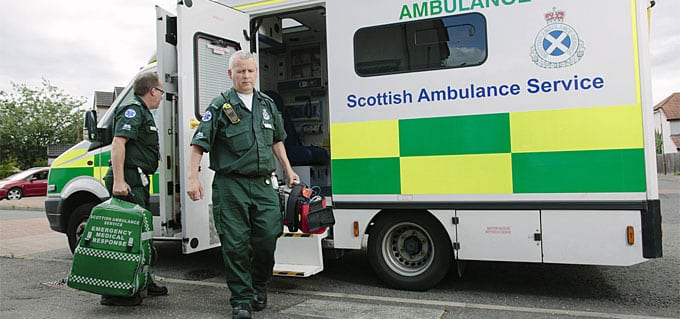ViaSat to Help Pilot Connected Ambulance Service in Scotland

A paramedic leaves his ambulance. Photo: Scottish Ambulance Service.
ViaSat announced it is working with The University of Aberdeen’s Centre for Rural Health, NHS Highland and the Scottish Ambulance Service on a pilot program called SatCare, which will enable paramedics to send high-resolution video and ultrasound images from connected ambulances to hospital-based medical experts ahead of a patient’s hospital arrival. The connected ambulances will use ViaSat’s satellite communications system, operating on its jointly owned Ka-Sat High Throughput Satellite (HTS) network.
The one-year SatCare trial, partly funded by the European Space Agency (ESA), aims to help approximately 1,000 patients living in remote and rural Scotland. The goal is to provide better patient care on long ambulance journeys, as well as provide more streamlined care upon hospital arrival, such as immediate transfer to an operating theatre.
As part of the pilot, five Scottish ambulances have been equipped with scanning equipment and ViaSat’s satellite broadband communications system. According to ViaSat, scans that take a paramedic less than five minutes to record and package with a video summary of the patient’s condition will be transmitted in seconds over the satellite system to the emergency department of Raigmore Hospital in Inverness, Scotland. The hospital experts will then assess the patient’s needs, give medical advice to the paramedic in transit, and mobilize resources or specialist teams required for the patient’s arrival.
The SatCare technology has been successfully tested using healthy volunteers. It will now be put into trial, helping several potentially life-threatening conditions, including: major trauma, chest pain, shortness of breath, abdominal pain and circulatory shock, all of which could benefit from more accurate early diagnosis.
“Point-of-care ultrasound, telemedicine and remote decision support have all offered potential over the years to improve care for our patients, but have often failed to secure the kinds of rigorous and substantial research platforms that allow firm conclusions to be made about efficacy. The SatCare trial aims for the numbers, methodological rigor and rural patient base to offer a real prospect of informing the debate on these interventions positively for years to come,” said Luke Regan, emergency consultant at Raigmore Hospital.